Ethical Analysis of Facebook's Business Practices Case Study
VerifiedAdded on 2022/12/20
|6
|1291
|1
Case Study
AI Summary
This case study provides an ethical analysis of Facebook's business practices, particularly focusing on the Cambridge Analytica data breach and its implications for user privacy. The analysis examines Facebook's actions through the lenses of four ethical theories: utilitarianism, deontological ethics, contract ethics, and virtue ethics. The study highlights how Facebook's practices, including data collection without consent and violations of user agreements, conflict with these ethical frameworks. It discusses the company's responsibility to protect user data, the lack of transparency in its data handling, and the potential impact of these actions on user trust and overall business ethics. The study references various academic sources to support its arguments and provides a comprehensive understanding of the ethical challenges faced by Facebook.
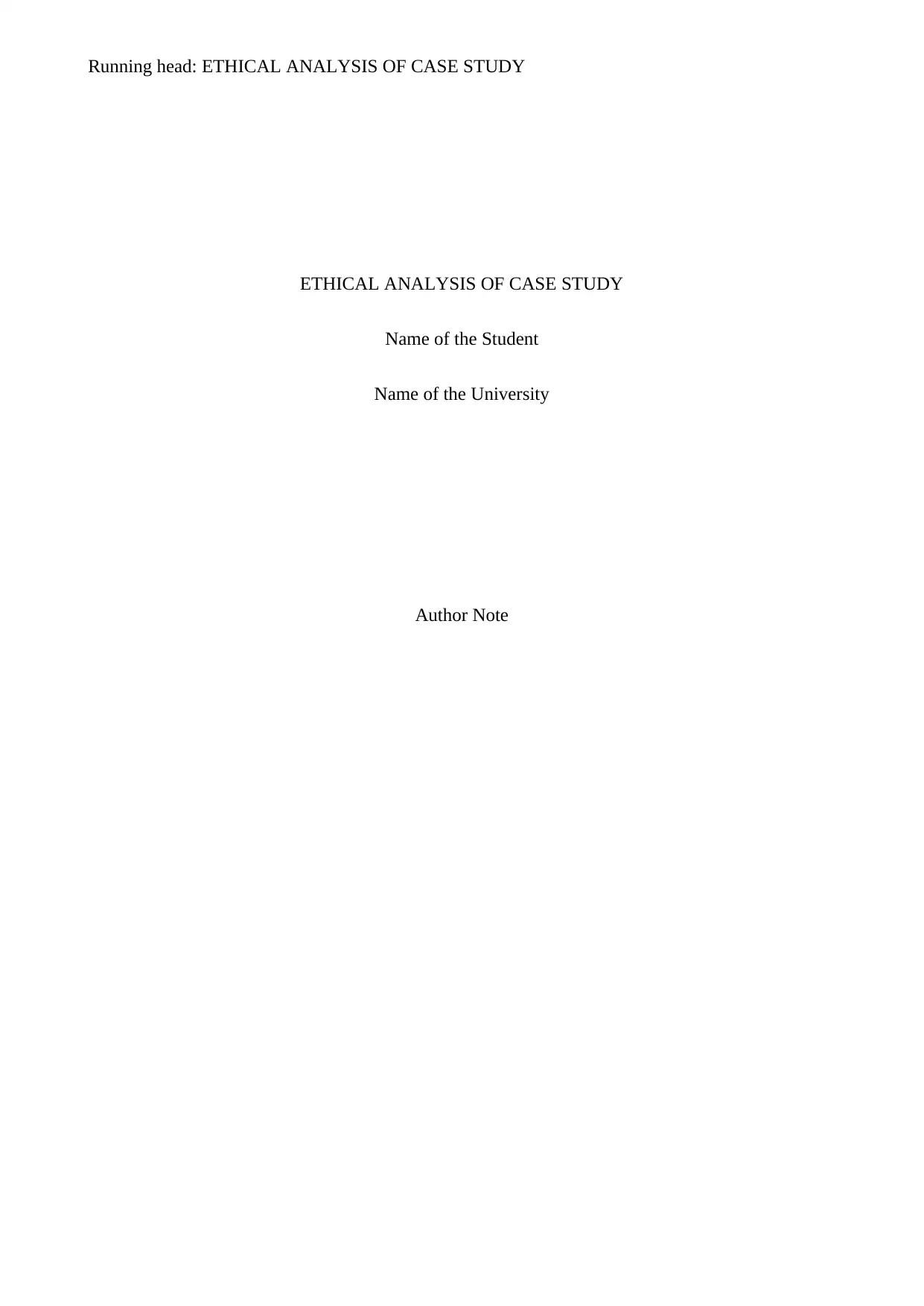
Running head: ETHICAL ANALYSIS OF CASE STUDY
ETHICAL ANALYSIS OF CASE STUDY
Name of the Student
Name of the University
Author Note
ETHICAL ANALYSIS OF CASE STUDY
Name of the Student
Name of the University
Author Note
Paraphrase This Document
Need a fresh take? Get an instant paraphrase of this document with our AI Paraphraser
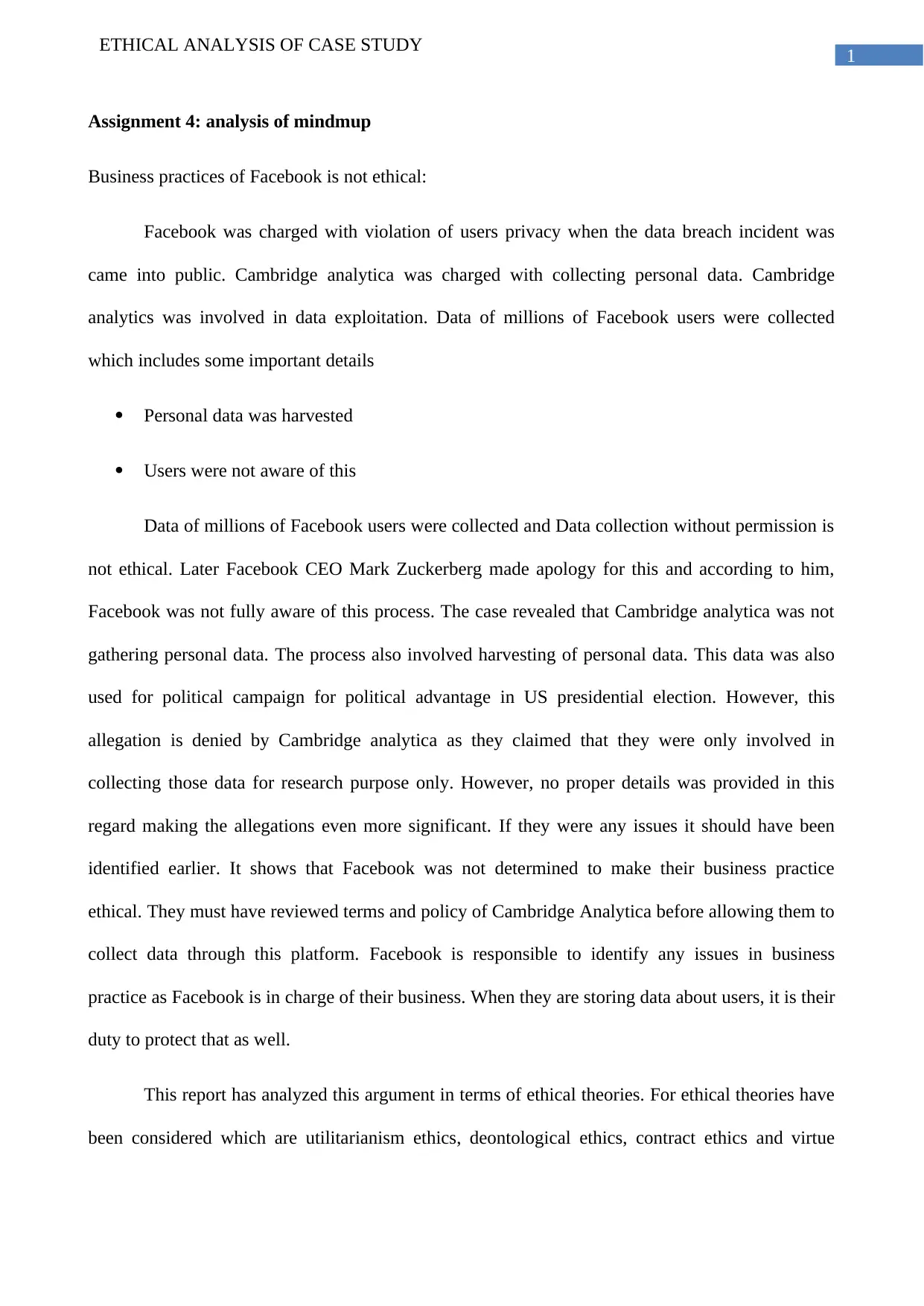
1
ETHICAL ANALYSIS OF CASE STUDY
Assignment 4: analysis of mindmup
Business practices of Facebook is not ethical:
Facebook was charged with violation of users privacy when the data breach incident was
came into public. Cambridge analytica was charged with collecting personal data. Cambridge
analytics was involved in data exploitation. Data of millions of Facebook users were collected
which includes some important details
Personal data was harvested
Users were not aware of this
Data of millions of Facebook users were collected and Data collection without permission is
not ethical. Later Facebook CEO Mark Zuckerberg made apology for this and according to him,
Facebook was not fully aware of this process. The case revealed that Cambridge analytica was not
gathering personal data. The process also involved harvesting of personal data. This data was also
used for political campaign for political advantage in US presidential election. However, this
allegation is denied by Cambridge analytica as they claimed that they were only involved in
collecting those data for research purpose only. However, no proper details was provided in this
regard making the allegations even more significant. If they were any issues it should have been
identified earlier. It shows that Facebook was not determined to make their business practice
ethical. They must have reviewed terms and policy of Cambridge Analytica before allowing them to
collect data through this platform. Facebook is responsible to identify any issues in business
practice as Facebook is in charge of their business. When they are storing data about users, it is their
duty to protect that as well.
This report has analyzed this argument in terms of ethical theories. For ethical theories have
been considered which are utilitarianism ethics, deontological ethics, contract ethics and virtue
ETHICAL ANALYSIS OF CASE STUDY
Assignment 4: analysis of mindmup
Business practices of Facebook is not ethical:
Facebook was charged with violation of users privacy when the data breach incident was
came into public. Cambridge analytica was charged with collecting personal data. Cambridge
analytics was involved in data exploitation. Data of millions of Facebook users were collected
which includes some important details
Personal data was harvested
Users were not aware of this
Data of millions of Facebook users were collected and Data collection without permission is
not ethical. Later Facebook CEO Mark Zuckerberg made apology for this and according to him,
Facebook was not fully aware of this process. The case revealed that Cambridge analytica was not
gathering personal data. The process also involved harvesting of personal data. This data was also
used for political campaign for political advantage in US presidential election. However, this
allegation is denied by Cambridge analytica as they claimed that they were only involved in
collecting those data for research purpose only. However, no proper details was provided in this
regard making the allegations even more significant. If they were any issues it should have been
identified earlier. It shows that Facebook was not determined to make their business practice
ethical. They must have reviewed terms and policy of Cambridge Analytica before allowing them to
collect data through this platform. Facebook is responsible to identify any issues in business
practice as Facebook is in charge of their business. When they are storing data about users, it is their
duty to protect that as well.
This report has analyzed this argument in terms of ethical theories. For ethical theories have
been considered which are utilitarianism ethics, deontological ethics, contract ethics and virtue
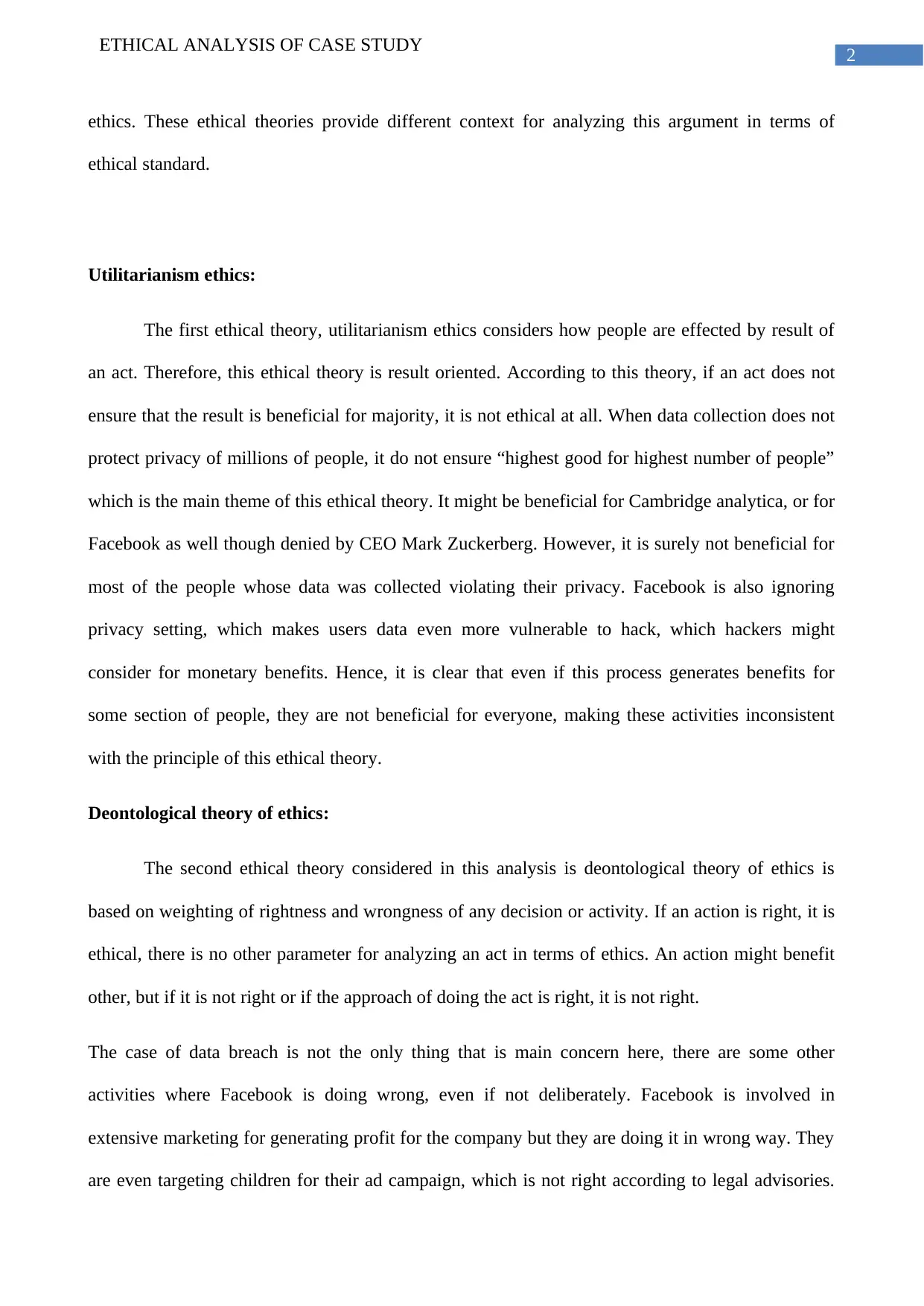
2
ETHICAL ANALYSIS OF CASE STUDY
ethics. These ethical theories provide different context for analyzing this argument in terms of
ethical standard.
Utilitarianism ethics:
The first ethical theory, utilitarianism ethics considers how people are effected by result of
an act. Therefore, this ethical theory is result oriented. According to this theory, if an act does not
ensure that the result is beneficial for majority, it is not ethical at all. When data collection does not
protect privacy of millions of people, it do not ensure “highest good for highest number of people”
which is the main theme of this ethical theory. It might be beneficial for Cambridge analytica, or for
Facebook as well though denied by CEO Mark Zuckerberg. However, it is surely not beneficial for
most of the people whose data was collected violating their privacy. Facebook is also ignoring
privacy setting, which makes users data even more vulnerable to hack, which hackers might
consider for monetary benefits. Hence, it is clear that even if this process generates benefits for
some section of people, they are not beneficial for everyone, making these activities inconsistent
with the principle of this ethical theory.
Deontological theory of ethics:
The second ethical theory considered in this analysis is deontological theory of ethics is
based on weighting of rightness and wrongness of any decision or activity. If an action is right, it is
ethical, there is no other parameter for analyzing an act in terms of ethics. An action might benefit
other, but if it is not right or if the approach of doing the act is right, it is not right.
The case of data breach is not the only thing that is main concern here, there are some other
activities where Facebook is doing wrong, even if not deliberately. Facebook is involved in
extensive marketing for generating profit for the company but they are doing it in wrong way. They
are even targeting children for their ad campaign, which is not right according to legal advisories.
ETHICAL ANALYSIS OF CASE STUDY
ethics. These ethical theories provide different context for analyzing this argument in terms of
ethical standard.
Utilitarianism ethics:
The first ethical theory, utilitarianism ethics considers how people are effected by result of
an act. Therefore, this ethical theory is result oriented. According to this theory, if an act does not
ensure that the result is beneficial for majority, it is not ethical at all. When data collection does not
protect privacy of millions of people, it do not ensure “highest good for highest number of people”
which is the main theme of this ethical theory. It might be beneficial for Cambridge analytica, or for
Facebook as well though denied by CEO Mark Zuckerberg. However, it is surely not beneficial for
most of the people whose data was collected violating their privacy. Facebook is also ignoring
privacy setting, which makes users data even more vulnerable to hack, which hackers might
consider for monetary benefits. Hence, it is clear that even if this process generates benefits for
some section of people, they are not beneficial for everyone, making these activities inconsistent
with the principle of this ethical theory.
Deontological theory of ethics:
The second ethical theory considered in this analysis is deontological theory of ethics is
based on weighting of rightness and wrongness of any decision or activity. If an action is right, it is
ethical, there is no other parameter for analyzing an act in terms of ethics. An action might benefit
other, but if it is not right or if the approach of doing the act is right, it is not right.
The case of data breach is not the only thing that is main concern here, there are some other
activities where Facebook is doing wrong, even if not deliberately. Facebook is involved in
extensive marketing for generating profit for the company but they are doing it in wrong way. They
are even targeting children for their ad campaign, which is not right according to legal advisories.
⊘ This is a preview!⊘
Do you want full access?
Subscribe today to unlock all pages.

Trusted by 1+ million students worldwide
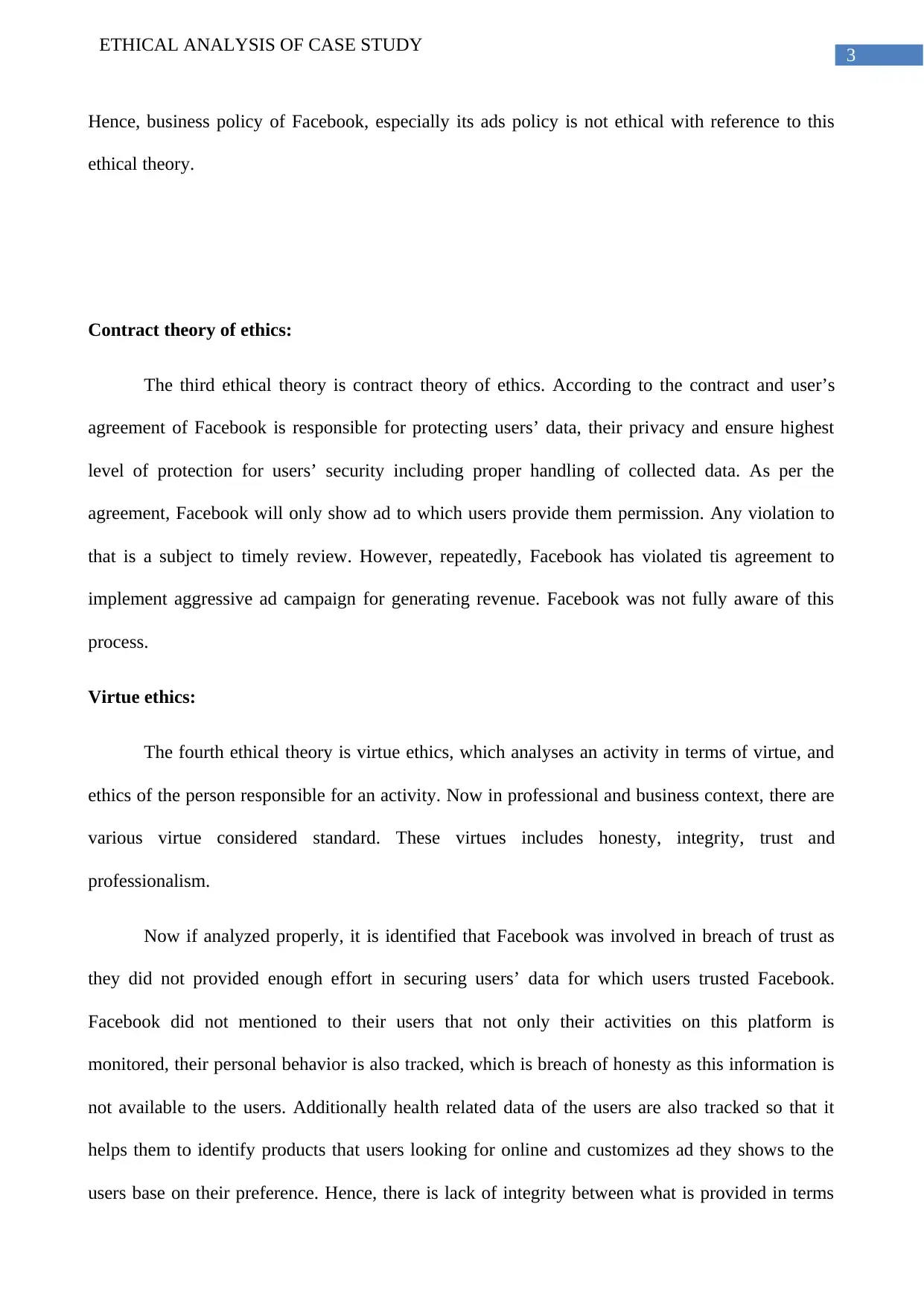
3
ETHICAL ANALYSIS OF CASE STUDY
Hence, business policy of Facebook, especially its ads policy is not ethical with reference to this
ethical theory.
Contract theory of ethics:
The third ethical theory is contract theory of ethics. According to the contract and user’s
agreement of Facebook is responsible for protecting users’ data, their privacy and ensure highest
level of protection for users’ security including proper handling of collected data. As per the
agreement, Facebook will only show ad to which users provide them permission. Any violation to
that is a subject to timely review. However, repeatedly, Facebook has violated tis agreement to
implement aggressive ad campaign for generating revenue. Facebook was not fully aware of this
process.
Virtue ethics:
The fourth ethical theory is virtue ethics, which analyses an activity in terms of virtue, and
ethics of the person responsible for an activity. Now in professional and business context, there are
various virtue considered standard. These virtues includes honesty, integrity, trust and
professionalism.
Now if analyzed properly, it is identified that Facebook was involved in breach of trust as
they did not provided enough effort in securing users’ data for which users trusted Facebook.
Facebook did not mentioned to their users that not only their activities on this platform is
monitored, their personal behavior is also tracked, which is breach of honesty as this information is
not available to the users. Additionally health related data of the users are also tracked so that it
helps them to identify products that users looking for online and customizes ad they shows to the
users base on their preference. Hence, there is lack of integrity between what is provided in terms
ETHICAL ANALYSIS OF CASE STUDY
Hence, business policy of Facebook, especially its ads policy is not ethical with reference to this
ethical theory.
Contract theory of ethics:
The third ethical theory is contract theory of ethics. According to the contract and user’s
agreement of Facebook is responsible for protecting users’ data, their privacy and ensure highest
level of protection for users’ security including proper handling of collected data. As per the
agreement, Facebook will only show ad to which users provide them permission. Any violation to
that is a subject to timely review. However, repeatedly, Facebook has violated tis agreement to
implement aggressive ad campaign for generating revenue. Facebook was not fully aware of this
process.
Virtue ethics:
The fourth ethical theory is virtue ethics, which analyses an activity in terms of virtue, and
ethics of the person responsible for an activity. Now in professional and business context, there are
various virtue considered standard. These virtues includes honesty, integrity, trust and
professionalism.
Now if analyzed properly, it is identified that Facebook was involved in breach of trust as
they did not provided enough effort in securing users’ data for which users trusted Facebook.
Facebook did not mentioned to their users that not only their activities on this platform is
monitored, their personal behavior is also tracked, which is breach of honesty as this information is
not available to the users. Additionally health related data of the users are also tracked so that it
helps them to identify products that users looking for online and customizes ad they shows to the
users base on their preference. Hence, there is lack of integrity between what is provided in terms
Paraphrase This Document
Need a fresh take? Get an instant paraphrase of this document with our AI Paraphraser
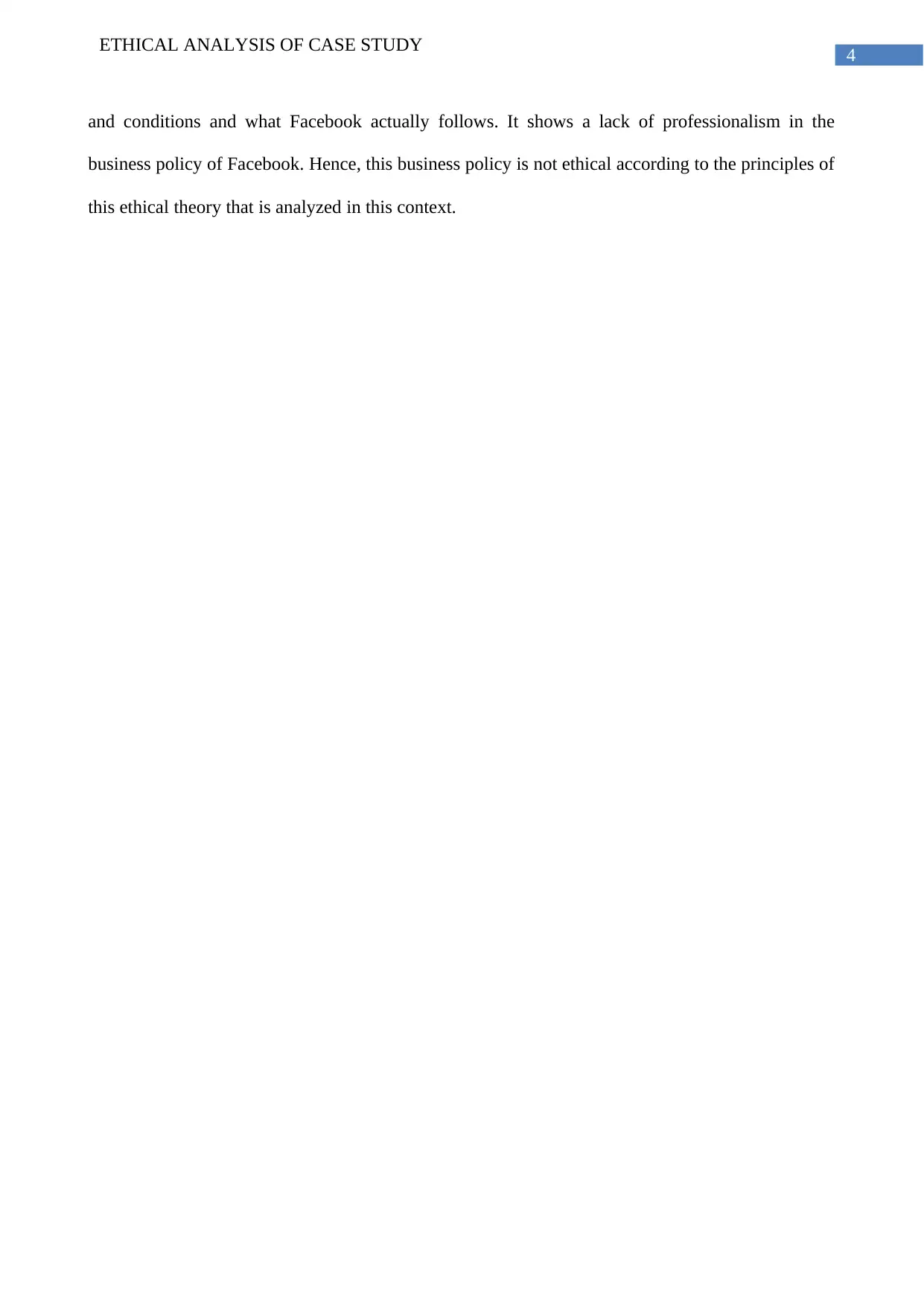
4
ETHICAL ANALYSIS OF CASE STUDY
and conditions and what Facebook actually follows. It shows a lack of professionalism in the
business policy of Facebook. Hence, this business policy is not ethical according to the principles of
this ethical theory that is analyzed in this context.
ETHICAL ANALYSIS OF CASE STUDY
and conditions and what Facebook actually follows. It shows a lack of professionalism in the
business policy of Facebook. Hence, this business policy is not ethical according to the principles of
this ethical theory that is analyzed in this context.

5
ETHICAL ANALYSIS OF CASE STUDY
References:
Fryer, M., 2016. A role for ethics theory in speculative business ethics teaching. Journal of business
ethics, 138(1), pp.79-90.
Koehn, D., 2017. Review of Virtue in Business: Conversations with Aristotle by Edwin Hartman.
Mill, J.S., 2016. Utilitarianism. In Seven masterpieces of philosophy (pp. 337-383). Routledge.
Sison, A.J.G., Ferrero, I. and Guitián, G. eds., 2018. Business Ethics: A Virtue Ethics and Common
Good Approach. Routledge.
Trevino, L.K. and Nelson, K.A., 2016. Managing business ethics: Straight talk about how to do it
right. John Wiley & Sons.
Vardy, P., 2016. The puzzle of ethics. Routledge.
Vitell, S.J. and Hunt, S.D., 2015. The general theory of marketing ethics: the consumer ethics and
intentions issues. Handbook on ethics and marketing, pp.15-37.
Wang, Y., Cheney, G. and Roper, J., 2016. Virtue Ethics and the Practice–Institution Schema: An
Ethical Case of Excellent Business Practices. Journal of Business Ethics, 138(1), pp.67-77.
ETHICAL ANALYSIS OF CASE STUDY
References:
Fryer, M., 2016. A role for ethics theory in speculative business ethics teaching. Journal of business
ethics, 138(1), pp.79-90.
Koehn, D., 2017. Review of Virtue in Business: Conversations with Aristotle by Edwin Hartman.
Mill, J.S., 2016. Utilitarianism. In Seven masterpieces of philosophy (pp. 337-383). Routledge.
Sison, A.J.G., Ferrero, I. and Guitián, G. eds., 2018. Business Ethics: A Virtue Ethics and Common
Good Approach. Routledge.
Trevino, L.K. and Nelson, K.A., 2016. Managing business ethics: Straight talk about how to do it
right. John Wiley & Sons.
Vardy, P., 2016. The puzzle of ethics. Routledge.
Vitell, S.J. and Hunt, S.D., 2015. The general theory of marketing ethics: the consumer ethics and
intentions issues. Handbook on ethics and marketing, pp.15-37.
Wang, Y., Cheney, G. and Roper, J., 2016. Virtue Ethics and the Practice–Institution Schema: An
Ethical Case of Excellent Business Practices. Journal of Business Ethics, 138(1), pp.67-77.
⊘ This is a preview!⊘
Do you want full access?
Subscribe today to unlock all pages.

Trusted by 1+ million students worldwide
1 out of 6
Related Documents
Your All-in-One AI-Powered Toolkit for Academic Success.
+13062052269
info@desklib.com
Available 24*7 on WhatsApp / Email
![[object Object]](/_next/static/media/star-bottom.7253800d.svg)
Unlock your academic potential
Copyright © 2020–2026 A2Z Services. All Rights Reserved. Developed and managed by ZUCOL.





